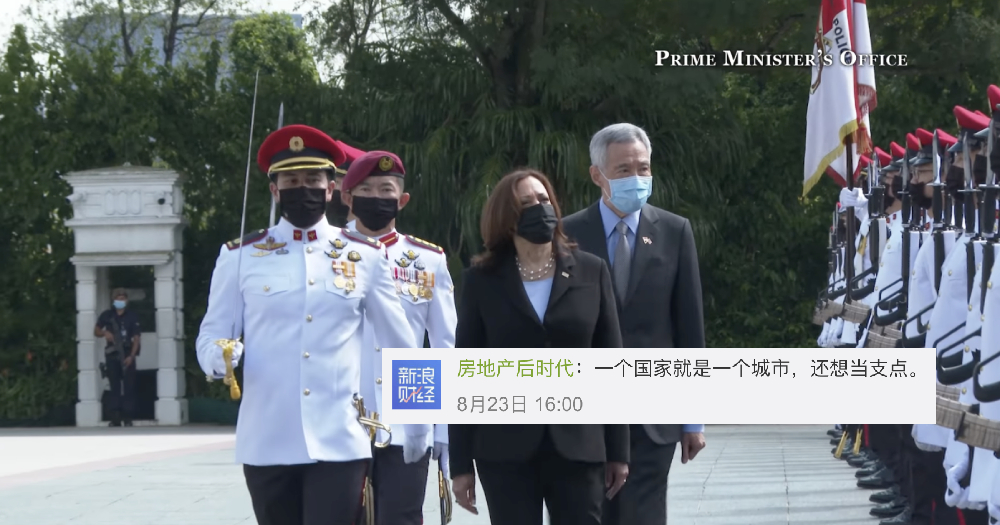U.S. Vice President Kamala Harris arrived in Singapore on Sunday (Aug. 22), and will be leaving for Vietnam on Tuesday (Aug. 24).
It was her first official visit to Asia.
During her visit, she met with President Halimah Yacob and Prime Minister Lee Hsien Loong, visited Changi Naval Base, and had an orchid named after her as well.
Chinese react online
Harris' visit was met with disdain among Chinese social media users, who made disparaging remarks about her, and accused the U.S. of attempting to meddle in the region's affairs, and to garner support from other countries to counter China's influence.
For instance, a Weibo user said, "A leopard doesn't change its spots, it has come to stir up trouble in Southeast Asia."
Besides remarks that veered towards personal attacks on Harris as a Black woman with South Asian descent, many also ridiculed Singapore, accusing it of attempting to do something that's supposedly not befitting of its physical size.
A comment read, "The entire country is a city, and they still want to provide support."
Yet another commenter said, "Singapore, as a small country, has its ways of survival as a small country, all's good as long as they don't choose a side."
Another Weibo user, noting that Harris' tour of Singapore and Vietnam represents a visit from the highest-ranking U.S. official thus far, quoted PM Lee on the comments he made at the Aspen Security Forum in early August.
PM Lee had likened China to "a formidable adversary", and cautioned the U.S. to not underestimate the country.
Some netizens dismissed Harris' visit as well, with a Weibo user saying, "(Singapore) has already made itself clear before she came, and gave enough face to her after her visit. That should be enough, on you go to the next stop."
Nationalistic Chinese media dismissed Harris' visit
Hawkish, ultra-nationalistic state-affiliated media Global Times (GT) sought to downplay Harris' visit as well, saying that Singapore "will draw a line" between being "useful" and being "made use of".
The media outlet cited Foreign Affairs Minister Vivian Balakrishnan's comments in a Sunday interview with CNA.
Vivian had said that while Singapore demonstrated its relevance to both major powers, there is a difference between "being useful and being made use of".
"We will not become one or the other's stalking horse to advance negative agendas," he said.
GT further said that Harris had "sidestepped a Singaporean journalist's question on U.S. commitment to allies", and reiterated "feeble" talking points about U.S. partnerships in Southeast Asia.
In two other op-eds, GT also claimed the U.S. "wooing" of Singapore after the "Afghan fiasco" would be "ineffective", and that the U.S. attempt to "contain" China is "wishful thinking".
China questions U.S. credibility to its allies
China has raised doubts over U.S. commitment to its allies, such as Ukraine, Japan and South Korea, in the wake of the U.S. chaotic withdrawal from Afghanistan.
In particular, it has highlighted Taiwan, a self-ruled island that Beijing views as part of China's territory, raising doubts if the U.S. would defend Taiwan in the event of war.
The narrative that "Afghanistan today" will be "Taiwan tomorrow" was even repeated among some Taiwanese.
Taiwanese President Tsai Ing-wen, as well as politicians from both ends of the political spectrum, have since rejected such a narrative, saying that Taiwan must not rely on external powers for its own defence.
Afghan chaos overshadows Harris' Singapore visit
Harris' visit to Singapore was made in the midst of the international fallout the U.S. is facing over its haphazard withdrawal from Afghanistan after two decades of occupation.
During a press conference on Aug. 23, Harris emphasised the U.S.' commitment to its allies and partners, including Singapore, which she said the U.S. has a "long-standing relationship" with.
PM Lee expressed his support for continued U.S. engagement in the region as well, saying that despite the ups and downs seen in the region, the U.S. has remained a "benign and constructive influence" as a "regional guarantor of security and supporter of prosperity".
He also expressed his gratefulness for the U.S. intervention that has "stopped terrorist groups from using Afghanistan as a safe base for 20 years".
In addition, both countries stressed the importance of adhering to a rules-based international order in the region.
Harris had also overseen the signing of MOUs between the two countries that will strengthen collaboration on issues such as cyber defence, climate action and environmental governance.
Related stories:
Top image adapted via Prime Minister's Office & Weibo
If you like what you read, follow us on Facebook, Instagram, Twitter and Telegram to get the latest updates.
